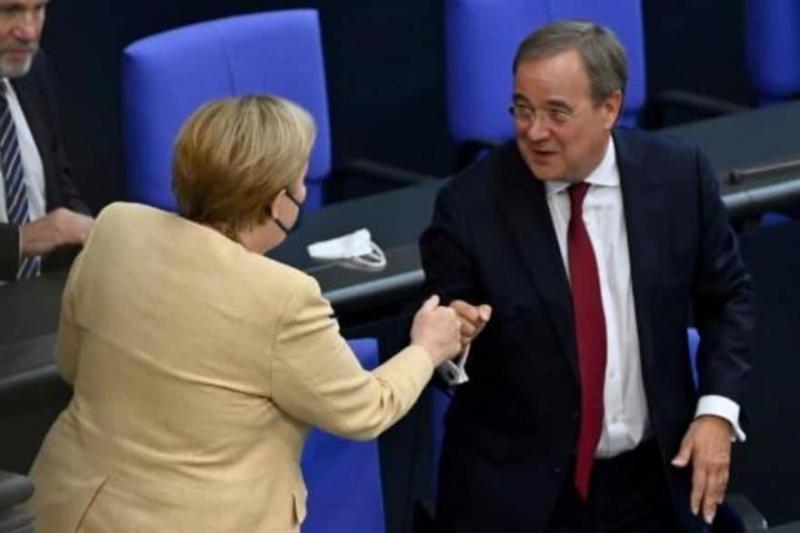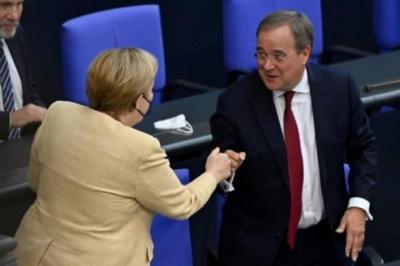German Chancellor Angela Merkel has once again thrown her weight behind the electoral campaign by providing strong support for her conservative camp's candidate Armin Laschet, who is under pressure due to the party's declining popularity, just under three weeks before an uncertain election. Addressing lawmakers gathered for their final session, Merkel stressed that the "best way" for Germany is a government led by Armin Laschet as Chancellor.
In a speech dominated by an electoral tone, Merkel declared that "his government will be characterized by stability, reliability, and moderation, which is what Germany needs." Merkel has consistently aimed to stay away from this election campaign since she decided some time ago to hand over power after her fourth term.
**Disastrous Polls**
However, figures from within her conservative camp have urged her to be more present, as disastrous polls for the Christian Democratic Union and its Bavarian ally, the Christian Social Union, suggest they could face a significant defeat in the legislative elections on September 26. In her consistent intervention before the upcoming election, Merkel seeks to leverage her enduring popularity to assist Armin Laschet, who is struggling. Since the summer, the popularity of the Christian Democratic Union and its Bavarian ally has significantly declined.
A poll from the RTE channel published on Tuesday placed the coalition for the first time below the 20% threshold, indicating it might receive 19% of voter intentions. This is unprecedented at the federal level for a party that has largely dominated the political landscape in the post-war period, having garnered 30% of voter intentions at the beginning of the year.
The conservatives, who received 32.9% of the votes in 2017, are now significantly trailing the Social Democratic Party, which had long been in low ranks. The SPD is now polling at 25% to 27%. Its leader, current Finance Minister and Vice Chancellor Olaf Scholz, who is criticized for lacking a strong presence, could be tasked with forming the next government.
Olaf Scholz has succeeded in building an image of a competent individual in the eyes of more than 60 million German voters. In the past three weeks, Merkel has intensified her interventions on behalf of the CDU leader and candidate who is not greatly appreciated by Germans.
**Building Bridges**
The campaign began during a rally of her camp in Berlin on August 21 when the Chancellor stated she was "strongly convinced" that Armin Laschet, the man capable of "building bridges between people," would succeed her as Chancellor. Merkel has appeared alongside him on several occasions, including on Monday evening during a conference dedicated to digitization.
On Sunday, they both traveled to North Rhine-Westphalia, one of the regions affected by the devastating floods led by Armin Laschet. Following a disaster that claimed more than 180 lives, linked by experts to climate change, Merkel praised her potential conservative successor, who "successfully manages the largest state in Germany."
Last weekend, Armin Laschet, who has not received much appreciation from voters after he had to assert himself as the conservative candidate, attempted to broaden his campaign team by surrounding himself with a group of experts.
In matters of finance and economics, he sought the expertise of Friedrich Merz, a former competitor for the party leadership representing the liberal wing, while Laschet embodies the centrist wing. However, political experts remain skeptical. "We need a team when we have a weak candidate. This is one of the principles included in any electoral guide," Peter Matouschek from the Forsa polling institute told AFP, emphasizing that "this is happening too late."
In recent weeks, Merkel has attacked the Social Democratic candidate, accusing him of "catering" to the radical left, the "Die Linke" party, which the Christian Democratic Union has always refused to negotiate with, especially due to its desire to withdraw Germany from NATO.




